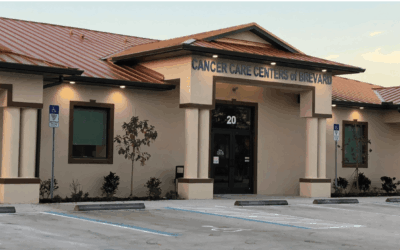Clinical Research Trials for Cancer in Brevard County
Understanding Clinical Trials
Clinical trials bring the latest treatment options to cancer patients in Brevard County, including Palm Bay and Melbourne, FL. Together with Sarah Cannon Research Institute (SCRI), a joint venture with US Oncology Research, our cancer specialists can offer some of the most recent breakthroughs in cancer treatment to our patients who qualify to participate. Find out more about why clinical research trials are important to not only our patients but cancer patients everywhere.
Purpose and Importance of Cancer Research Trials
Clinical trials are a key research tool for developing new and better treatment therapies for all types of cancer. Without cancer research and clinical trial participants, most of the cancer treatments used today as a standard treatment would not be available.
There are four different types of clinical trials, which include:
Treatment trials: Testing new drugs, medical procedures, or combinations of treatments. Most of the clinical research trials available to patients at Cancer Care Centers of Brevard are in this category.
Prevention trials: Looking at cancer risk and ways to reduce that risk by either doing something (called action studies) like making lifestyle changes, or by taking something (called agent studies) such as medicines, vitamins, or minerals.
Screening trials: Testing new ways to find a disease early, when it may be more easily treated.
Quality of life trials: Exploring ways to improve comfort and quality of life for cancer patients.
For more information, contact the clinical research nurses at Cancer Care Centers of Brevard.
Jessica Starr
Clinical Research Nurse
CCCB at Palm Bay
20 San Filippo SE, Palm Bay, FL 32909
Kim Dean, RN, BSN, OCN
Clinical Research Nurse
CCCB at Melbourne-Eau Gallie
2290 W Eau Gallie Blvd, Melbourne, FL 32935
How Clinical Trials are Conducted
Physicians and cancer researchers design clinical trials to better understand how a new treatment works or how cancer treatments already in use can be combined for better outcomes. Every research trial is conducted according to strict scientific and ethical principles. Before each study begins, a protocol is developed describing both the process and the necessity of each part of the study. Before the trial starts a third-party committee consisting of cancer specialists will review the protocol to ensure its safety for participants.
Each study has eligibility criteria for who can or cannot participate in the study, which may include the type of cancer, past cancer treatment regimens, age, gender, medical history, and current health status.
Use of Placebos
Placebos, or inactive treatments, are not typically in use when conducting cancer clinical trials. If there happens to be any possibility that a placebo could be given, the participant must be notified of this before participating.
Randomization
Every patient who chooses to participate in a clinical trial will receive life-saving treatment. Clinical trial randomization is the process of assigning patients randomly to groups that receive different treatments. In the simplest trial design, the investigational group receives the new treatment and the control group receives standard therapy. At several points during and at the end of the clinical trial, researchers compare the groups to see which treatment is more effective or has fewer side effects.
Randomization helps prevent bias. Bias occurs when a trial's results are affected by human choices or preferences that could cause the results to be skewed.
Randomization happens in all Phase III trials and some Phase II trials.
Phases of Clinical Trials
Clinical Trials are structured into four different phases. Most of the clinical trials at Cancer Care Centers of Brevard are Phase III (3) or Phase IV (4).
Phase I: Phase 1 clinical trials are designed to test a new therapy in a small group of people (about 15-30) for the first time to evaluate the safety, including safe dosage range and possible side effects. It can include healthy participants or patients.
Phase II: Phase 2 clinical trials are designed to study the new therapy in a larger group of people (less than 100) to determine how effective it is and to further evaluate its safety. It is conducted in participants with the condition or disease under study and will determine common short-term adverse effects and risks.
Phase III: Phase 3 clinical trials are designed to study the effectiveness of the new therapy in large groups of patients (from 100 to thousands) by comparing the therapy to other standard or experimental therapies as well as to monitor adverse effects, and collect information that will allow the therapy being studied to be used safely.
Phase IV: Phase 4 clinical trials are conducted after a therapy has been approved by the FDA and is marketed. Many of these studies are designed to monitor the effectiveness of a newly approved therapy in the general population and to collect information about any adverse effects associated with widespread use.
How Cancer Clinical Trials Can Benefit You
Participating in a clinical trial gives you access to new research treatments before they are widely available. Additionally, your participation also may help others by contributing to medical research.
It’s important to understand that clinical trial participation is strictly voluntary, and not every patient qualifies to participate. If you’re interested, ask your oncologist if there is an available trial that you could benefit from.
Those considering participation will be given the key facts such as the purpose, risks, and benefits of a clinical trial— a process called informed consent. You will never be added to a trial without your approval.
If you choose not to participate, that’s fine too. And if you start the trial and change your mind later you may withdraw your decision at any time and for any reason.
For most patients, clinical trials are not the first course of treatment that will be tried. But, as you progress through your cancer treatment process, you may qualify for a study that could benefit you and other cancer patients in the future.
Read our clinical trials frequently asked questions, contact us directly or click on the link below to learn more about the clinical trials available at the Cancer Care Center of Brevard.
For more information, contact the clinical research nurses at Cancer Care Centers of Brevard.
Jessica Starr
Clinical Research Nurse
CCCB at Palm Bay
20 San Filippo SE, Palm Bay, FL 32909
Kim Dean, RN, BSN, OCN
Clinical Research Nurse
CCCB at Melbourne-Eau Gallie
2290 W Eau Gallie Blvd, Melbourne, FL 32935
CCCB Locations Offering Clinical Trials
Participating in clinical trials allows us to provide valuable access to new cancer research to people right here in our community. Our patients are able to access the latest therapies for cancer, while their own physician continues to monitor their care. Patients are also able to remain at home near family and loved ones.

